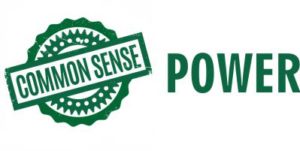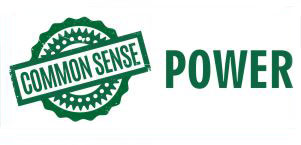The Power of Common Sense
“My Opinions”
Common Sense: Ordinary good sense, sound practical judgment. Common Sense is the foundation to making positive changes.
Some of us use a great deal of common sense most of the time. Some of us, it seems, use very little. All of us have the potential. Why is it when sometimes we know better but fail to use good judgement?
There are many causes that deter us from using common sense. To name a few – substance use, emotions, (such as anger) ulterior motives, (such as greed) peer pressure, etc.
What does common sense mean to you? Can you think of some examples of when you have failed to use common sense? What was affecting your judgement at that time (what were the deterrents)? Now think of examples of following through with good judgement. What was your state of mind? Why do you think you were able to think through and evaluate your options better?
“No matter the situation, never let your emotions overpower your intelligence”
“Responsibility to yourself means refusing to let others do your thinking”
“Few are those who see with their own eyes and feel with their own hearts”
“The authority of a thousand is not worth the humble reasoning of a single individual”
“Being your true self can only come from separating your thinking from crowd mentality”
“Think for yourself or others will think for you without thinking of you”
“The individual has always had to struggle to keep from being overwhelmed by the crowd”
“To find yourself is to think for yourself”
“If you think like everyone else then you aren’t thinking”
SELF TALK – is basically self generated dialogue taking place in our minds. We all do it. It’s part of being human. Don’t confuse self talk with a mental illness trait of hearing and talking to voices in their head. This is from a chemical imbalance in their brain.
There is positive self talk and negative self talk. Be aware of what we are telling ourselves. Kind of depends on what’s going on at the moment. It may be advantageous to fine-tune our self talk, more positive and less negative. As human beings we are all capable of doing this do to our self awareness.
Self Awareness – Conscious knowledge about yourself. The ability to monitor our inner world, our thoughts, and emotions as they arise.
CIVILITY – Politeness and courtesy in behavior or speech.
Civility is about more than just politeness, although politeness is a necessary first step. It is about disagreeing without disrespect, seeking common ground as a starting point for dialogue about differences, listening past one’s preconceptions, and teaching others to do the same.
Respectful conversation: For example if the subject of politics comes up, one may declare up front, “ I lean left but have many conservative views”, and the other may say, they are conservative although somewhat moderate at times. That being said, those two people can have a productive and respectful conversation within that realm of up-front knowledge.
LISTENING SKILLS – Maintain an open mind and attitude, showing respect to the speaker. Listen to everything, rather than nitpicking particular points. Wait for an appropriate time to bring up your points. Try not to assume or jump to conclusions. This is hard to do for all of us but the more we consciously practice this, it does become easier.
CRITICAL THINKING – Many of us think it is in our nature to do so, but much of our thinking, left to itself, is biased, distorted, partial, uninformed, or downright prejudiced. Yet, the quality of our life and that of what we produce, make, or build depends precisely on the quality of our thought. Shoddy thinking is costly, both in money and in quality of life.
Critical thinking is self-directed, self-disciplined, self-motivated, and self-corrective thinking. It entails effective communication and problem solving abilities, as well as a commitment to overcome our native egocentrism and sociocentrism.
Egocentrism – Someone who thinks only of themselves and their own wants, and does not consider other people.
Sociocentrism – Putting the needs and concerns of a social group or organization ahead of your own. The judging of your group to be superior to other groups.
Empathy – The ability to understand and share the feelings of another. Common saying – “Putting yourself in their shoes”.
Propaganda – Information that is not objective and is used primarily to influence an audience and further an agenda, The information may be true or false, but it is always carefully selected for its political effect or to support a motive.
Self-Justification – The act or fact of justifying oneself, especially offering excessive reasons, explanations, excuses, ect., for an act or thought. To a great extent, we humans are are great at fleeing from reality. We want to ignore the facts, shun any opposing criticism or feedback, and we hold dearly onto our beliefs , attitudes, and choices. When our minds are made up, thats it – me or nothing.
Self-Deception – The action or practice of allowing oneself to believe that a false or unvalidated feeling, idea, or situation is true. I’d have to say we probably lie or deceive ourselves much more than we do others.


